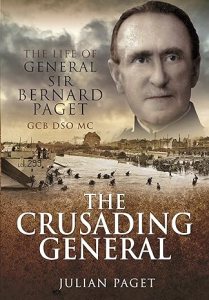Sir Bernard Paget was a senior British general during the Second World War who held a succession of important commands. However, in six years of war he only held command in an active theatre for seven days, as commander of Sickleforce in the ill-fated Norwegian campaign in April-May 1940. Although he was praised for his “skillful dispositions” in Norway by Prime Minister Neville Chamberlain in the House of Commons, Paget was denied by fortune another opportunity to command in battle. Instead, he served as commander of the Home Forces, 1941-43; 21st Army Group, 1943-44; and the Middle East, 1944-46.
The Crusading General: The Life of General Sir Bernard Paget, GCB, DSO, MC is a biography of the subject’s full career by his eldest son Julian Paget. An interesting chapter in the volume is “Who Planned D-Day (1942-44)” which reviews SKYSCRAPER, the plan Paget developed for the invasion of the continent, and compares it to the COSSAC plan by General F.E. Morgan and the plan that Montgomery actually implemented on June 6, 1944. Post-war, Bernard Paget expressed the opinion that SKYSCRAPER was much better than Morgan’s plan and was “very similar to that actually carried out.” The chapter “Forging the Sword (1941-43)” considers Paget’s training of the British army for the invasion of Europe. It was his “greatest achievement” and earned him the reputation as the greatest trainer of troops since Sir John Moore. The author writes that Paget “created and trained the 21st Army Group, but was denied the satisfaction of commanding it in battle. He was to Montgomery what Moore was to Wellington.”
Book Review: The Crusading General: The Life of General Sir Bernard Paget, GCB, DSO, MC
04 Wednesday Oct 2023
Posted in Uncategorized
